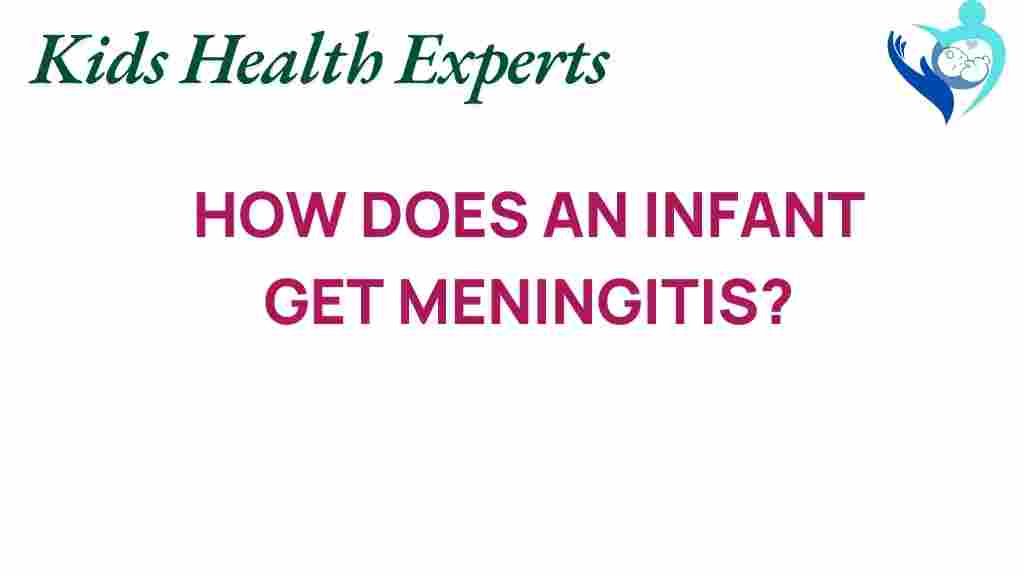Unraveling the Mystery: How Do Infants Contract Meningitis?
Meningitis is a serious infection that affects the protective membranes covering the brain and spinal cord. Understanding how infants contract meningitis is crucial for parents, caregivers, and healthcare professionals. This article will delve into the various ways infants can be exposed to the bacteria and viruses that cause this condition, the symptoms to look out for, and the preventive measures that can be taken to protect these vulnerable individuals.
What is Meningitis?
Meningitis is primarily an inflammation of the protective membranes, known as the meninges, surrounding the brain and spinal cord. This condition can be caused by different pathogens, including:
- Bacteria: Bacterial meningitis is often more severe and can lead to serious health complications.
- Viruses: Viral meningitis is generally less severe but can still pose risks, especially to infants.
Infants are particularly susceptible to meningitis due to their developing immune systems. Understanding the transmission routes can help in preventing infection.
How Infants Contract Meningitis
Infants can contract meningitis through various routes, primarily through exposure to infected individuals or contaminated environments. Here are the main ways infants can become infected:
1. Through Close Contact with Infected Individuals
Meningitis can spread through respiratory droplets when an infected person coughs or sneezes. Infants can contract the infection through:
- Close contact with adults, especially those who are asymptomatic carriers.
- Sharing utensils, cups, or other personal items.
- Being in close quarters in daycare settings or crowded places.
2. From Infected Mothers During Birth
Infants can be exposed to meningitis-causing bacteria during childbirth. For instance, if a mother has a bacterial infection such as Group B Streptococcus, the infant can contract the infection during delivery.
3. Via Contaminated Surfaces
Meningitis-causing pathogens can survive on surfaces for varying periods. Infants may touch contaminated surfaces and then put their hands in their mouths. Common sources include:
- Toys that have been handled by other children.
- Changing tables and public surfaces.
- Healthcare environments if proper hygiene is not maintained.
4. From Invasive Procedures
In rare cases, infants can contract meningitis from medical procedures, such as:
- Lumbar punctures.
- IV lines or catheters.
Healthcare professionals should take extra precautions during these procedures to prevent infection.
Symptoms of Meningitis in Infants
Recognizing the symptoms of meningitis in infants is crucial for early detection and treatment. Symptoms can vary, but common signs include:
- Fever: A high fever can be one of the first signs, although some infants may have a lower than normal temperature.
- Irritability: Infants may become unusually fussy and hard to comfort.
- Poor Feeding: A noticeable decrease in appetite can occur.
- Vomiting: Infants may experience vomiting or feeding difficulties.
- Stiff Neck: While more common in older children, stiffness can sometimes be observed in infants.
- Bulging Fontanelle: The soft spot on an infant’s head may appear swollen.
- Seizures: In severe cases, seizures may occur.
If you notice any of these symptoms, it is essential to seek medical attention immediately, as early intervention is key to improving outcomes.
Preventing Meningitis in Infants
Prevention is paramount when it comes to protecting infants from meningitis. Here are some effective strategies:
1. Vaccination
Vaccination is one of the most effective ways to prevent certain types of bacterial meningitis. Recommended vaccines include:
- Haemophilus influenzae type b (Hib): Protects against a common cause of bacterial meningitis.
- Pneumococcal vaccine: Helps prevent infections caused by Streptococcus pneumoniae.
- Meningococcal vaccine: Essential for protecting against Neisseria meningitidis.
Consult with your pediatrician about the vaccination schedule for your infant.
2. Good Hygiene Practices
Encouraging good hygiene practices can significantly reduce the risk of meningitis:
- Wash hands frequently, especially after changing diapers or before feeding.
- Disinfect toys and surfaces regularly.
- Avoid sharing utensils and personal items.
3. Avoiding Crowded Places
During peak illness seasons, try to minimize your infant’s exposure to crowded places where infections can spread more easily.
4. Awareness of Symptoms
Educate yourself and those around you about the symptoms of meningitis. Early recognition can lead to quicker treatment.
Healthcare and Meningitis Awareness
Healthcare professionals play a critical role in meningitis prevention through awareness and education. Parents should feel empowered to ask questions and seek guidance regarding:
- Vaccination schedules and recommendations.
- Signs and symptoms of meningitis.
- Best hygiene practices for infants.
Healthcare providers should also promote awareness campaigns within communities to ensure that everyone understands the risks associated with meningitis.
Troubleshooting Tips for Parents
If you suspect your infant is showing symptoms of meningitis, consider the following troubleshooting tips:
- Monitor Symptoms: Keep a close eye on your infant’s symptoms, noting any changes or worsening conditions.
- Keep a Log: Document when symptoms began, their severity, and any other relevant information to share with your healthcare provider.
- Trust Your Instincts: If you feel something is wrong, do not hesitate to seek medical care.
Remember, early medical intervention is vital in managing meningitis effectively.
Conclusion
Understanding how infants contract meningitis is essential for prevention and early intervention. By being aware of the symptoms and adopting good hygiene practices, parents and caregivers can significantly reduce the risk of infection. Vaccination plays a crucial role in protecting infants from serious bacterial forms of meningitis. For those interested in learning more about meningitis, you can visit this informative resource.
Awareness and education are key components in the fight against meningitis. By staying informed and vigilant, we can help ensure the health and safety of our infants against this potentially life-threatening infection.
This article is in the category Conditions and created by KidsHealthExperts Team
